In today’s interconnected world, agencies play a pivotal role in facilitating a wide range of services, bridging gaps between businesses, governments, and individuals. Whether you’re looking to advertise your brand, manage a large project, or ensure compliance with regulations, there’s likely an agency designed to meet your needs. But what exactly is an agency, and why are they so essential?
What Is an Agency?
An agency is an organization or entity that provides specialized services on behalf of another party. These services can range from consultancy and management to representation and execution. The term “agency” is broad and applies to various fields such as marketing, government, finance, real estate, and more.
At its core, an agency operates under a fiduciary relationship, where it acts in the best interests of its clients or stakeholders. This principle is foundational for building trust and delivering effective solutions.
Types of Agencies
Agencies can be categorized based on the industries they serve or the nature of their functions. Here are a few common types:
1. Advertising and Marketing Agencies
These agencies specialize in promoting brands, products, or services. They handle everything from creative campaigns to digital marketing strategies, ensuring businesses reach their target audience effectively.
2. Recruitment and Staffing Agencies
Recruitment agencies help businesses find the right talent for their needs. They manage the hiring process, from sourcing candidates to conducting initial interviews.
3. Government Agencies
Government agencies are public entities responsible for implementing laws, regulations, and policies. Examples include the Environmental Protection Agency (EPA) and the Federal Bureau of Investigation (FBI).
4. Travel Agencies
Travel agencies simplify the process of booking trips by arranging flights, accommodations, and itineraries for clients.
5. Creative Agencies
These agencies provide services like graphic design, content creation, branding, and video production to help organizations establish a strong visual identity.
Why Are Agencies Important?
1. Expertise
Agencies are staffed with professionals who specialize in specific areas, ensuring high-quality service. Their expertise often surpasses what in-house teams can offer.
2. Scalability
For businesses and governments, agencies provide the flexibility to scale operations up or down without long-term commitments.
3. Cost Efficiency
Hiring an agency can often be more cost-effective than building and maintaining an in-house team, especially for short-term projects.
4. Access to Resources
Agencies have access to advanced tools, technologies, and networks that may not be readily available to their clients.
5. Objective Perspective
An external agency can provide unbiased insights and strategies, which can be particularly beneficial for creative or strategic endeavors.
Challenges of Working with Agencies
While agencies offer numerous advantages, there are challenges to consider:
- Communication Gaps: Miscommunication can lead to unmet expectations or delays.
- Cost Overruns: Without clear agreements, projects can exceed budgets.
- Dependency: Over-reliance on an agency might hinder the development of internal capabilities.
To mitigate these issues, clear contracts, regular updates, and thorough vetting processes are essential.
Choosing the Right Agenc
Selecting the right agency involves more than just reviewing portfolios. Here are key factors to consider:
- Reputation: Look for testimonials, reviews, and case studies.
- Alignment: Ensure the agency’s values and expertise align with your goals.
- Budget: Clarify costs upfront to avoid surprises.
- Communication: Assess their responsiveness and willingness to collaborate.
Conclusion
Agencies are indispensable partners in today’s fast-paced world. They bring expertise, efficiency, and innovation to the table, enabling businesses, governments, and individuals to achieve their objectives. By understanding the various types of agencies and their functions, you can make informed decisions and leverage their capabilities to your advantage.
Whether you’re a startup seeking marketing expertise or a government agency looking for strategic solutions, the right agency can make all the difference.
FAQs
1. What is an agency?
An agency is an organization or entity that provides specialized services or acts on behalf of individuals, businesses, or governments to achieve specific goals.
2. What are the main types of agencies?
Some common types include:
- Advertising and Marketing Agencies: Promote brands and products.
- Recruitment Agencies: Help with hiring and staffing.
- Government Agencies: Implement policies and enforce laws.
- Travel Agencies: Plan and arrange travel.
- Creative Agencies: Provide design, branding, and media production services.
3. How do agencies differ from in-house teams?
Agencies are external organizations hired for specific tasks or projects, offering specialized expertise and scalability. In contrast, in-house teams are internal staff employed by the company.
4. Why should I hire an agency?
Agencies are beneficial for their:
- Specialized expertise.
- Access to advanced tools and resources.
- Flexibility to scale projects.
- Objective perspectives on strategies.
5. Are agencies cost-effective?
Agencies can be cost-effective, especially for short-term projects or specialized services, as they eliminate the need for hiring and training full-time staff. However, clear budgeting is essential to avoid overspending.
6. How do I choose the right agency?
Consider the following:
- Reputation and reviews.
- Alignment with your goals.
- Budget and pricing structure.
- Communication and collaboration style.
7. What are the challenges of working with an agency?
Potential challenges include:
- Miscommunication or unclear expectations.
- Dependency on the agency for certain tasks.
- Budget overruns if not carefully managed.
8. How do agencies handle confidentiality?
Reputable agencies typically sign non-disclosure agreements (NDAs) to protect client information and maintain confidentiality.
9. What industries commonly use agencies?
Agencies are common in industries like:
- Marketing and advertising.
- Real estate.
- Government services.
- Travel and tourism.
- Technology and IT services.
10. Can small businesses benefit from hiring an agency?
Yes, small businesses can benefit significantly by outsourcing tasks like marketing, recruitment, or IT support to agencies, as it allows them to access professional services without the overhead of an in-house team.
11. How are agency fees structured?
Agency fees can vary based on the type of service. Common structures include:
- Flat fees for specific projects.
- Hourly rates for ongoing tasks.
- Commission-based fees for results-driven services (e.g., ad campaigns).
12. What should I include in a contract with an agency?
A good contract should cover:
- Scope of work.
- Deliverables and timelines.
- Payment terms.
- Confidentiality agreements.
- Termination clauses.
13. What’s the difference between a government and a private agency?
- Government Agencies: Public organizations funded by taxpayers, focused on implementing laws and policies.
- Private Agencies: Commercial entities offering services for profit, catering to individuals or businesses.
14. Can agencies work remotely?
Yes, many agencies operate remotely, using digital tools to collaborate with clients and deliver services efficiently.
15. How do I ensure successful collaboration with an agency?
- Set clear goals and expectations.
- Communicate regularly.
- Provide timely feedback.
- Establish a transparent budget and workflow.











